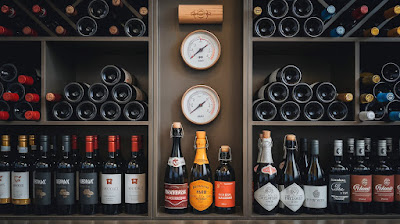The preservation of wine and other beverages requires special attention to storage conditions, with temperature and humidity being two fundamental factors in maintaining original quality and flavor. Variables such as excessive heat or dryness can compromise both the liquid and the packaging, impairing the consumer experience. This text explores how these factors influence preservation and presents good practices for protecting beverages.
1. The Importance of Stable Temperature
Temperature plays a crucial role in the preservation of wines and beverages. Extreme variations can cause expansion and contraction of the liquid, resulting in oxidation and changes in flavor. For wines, the ideal temperature ranges between 12°C and 16°C, while other beverages, such as craft beers, may require specific temperatures depending on their type. The use of climate-controlled wine cellars or adjustable refrigerators is recommended to ensure thermal stability.
2. Humidity Control to Protect Corks and Packaging
Humidity is also essential, especially in the case of wines with cork stoppers. An environment that is too dry can dry out corks, allowing air to enter and oxidizing the wine. On the other hand, excess humidity can encourage the growth of mold on labels and bottles. The ideal humidity level for wine storage is between 50% and 70%. Equipment such as dehumidifiers or humidifiers can be used to adjust these conditions.
3. Impact on the Preservation of Other Beverages
Although wine is especially sensitive, other beverages, such as spirits and beers, also benefit from controlled conditions. Prolonged exposure to heat can deteriorate alcoholic beverages, altering their aroma and flavor. In addition, metal or plastic packaging can react with humidity and cause corrosion or deformation. A cool, dry place is essential to extend the shelf life of these beverages.
Conclusion
The ideal combination of stable temperature and adequate humidity control is essential for the preservation of wines and other beverages. Investing in appropriate storage ensures the preservation of original characteristics, providing a complete experience for the consumer. Whether in a climate-controlled wine cellar or a well-planned space, taking care of these details is essential to maintain the quality and value of drinks over time.
